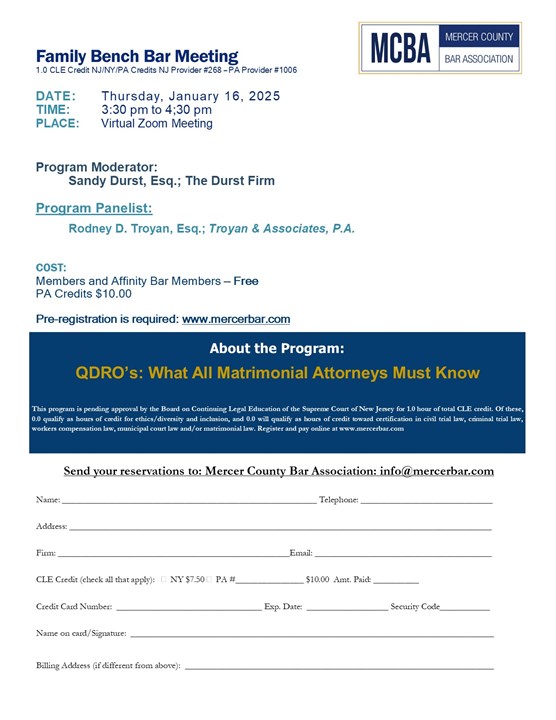If you are a member of the Mercer County Bar Association, please take advantage of this free CLE program. If you are not yet a member, join today in order to take advantage of this opportunity.

If you are a member of the Mercer County Bar Association, please take advantage of this free CLE program. If you are not yet a member, join today in order to take advantage of this opportunity.

Due to the ongoing shortage of judges and the enormous case load of divorce cases in Mercer County, attorneys were informed today that all new divorce filings will continue to be transferred to either Burlington, Middlesex or Atlantic county. The next review of this procedure is set for May 1, 2025.
Obviously, this can greatly impact your case. We have the experience and know-how to help mitigate this inconvenience. If you have questions about this development, The Durst Firm has the answers you need. Reach out before filing.
With wedding season right around the corner, it is important to consider one aspect of wedding planning that many couples overlook or find distasteful: a prenuptial agreement. As couples are marrying later in life or embarking upon a second marriage, it is reasonable to expect that assets and debts have come into being. A prenuptial agreement can address how those premarital assets and liabilities will be addressed if the marriage breaks down.
A prenuptial agreement, commonly referred to as a “prenup,” is a legal contract entered into by a couple before they marry. This document outlines how assets and debts will be handled in the event of a divorce, separation, or death. While discussing a prenup may not be the most romantic aspect of wedding planning, it’s a practical step that can provide clarity and protection for both parties.
At its core, a prenup establishes the property and financial rights of each spouse in the unfortunate event that the marriage ends. Preparing a prenuptial agreement is analogous to preparing a will and related estate planning documents.
Contrary to popular belief, prenups aren’t just for the wealthy. Prenups can be helpful for small/family business owners and anyone looking to add a degree of clarity and certainty in the unfortunate event of a divorce. This includes individuals with significant debts, those who own a business, and those who want to safeguard inheritances or personal assets.
A prenup can cover a variety of issues, including:
However, there are limitations. In New Jersey, a prenup cannot address issues of custody, parenting time, or child support.
Obtaining a prenup typically involves the following steps:
While the thought of a prenup may bring discomfort, it’s a strategic move that can prevent future stress and conflict. By setting clear expectations and protections, a prenup can actually strengthen the foundation of a marriage, ensuring that both parties enter the union with a mutual understanding of their financial partnership.
I hope this article provides a clear overview of prenuptial agreements and their importance. If you’re considering a prenup, it’s advisable to consult with a legal professional to understand the specific laws and requirements in your state.
At The Durst Firm we never tell a potential client if or when they should file for divorce. That is a deeply personal decision and one that should not be entered into lightly. Our role is to review the situation and advise as to various courses of action based on our extensive experience and knowledge
That being, if you are a Mercer County resident and are considering filing for divorce, the time to act may be NOW! As a result of recent changes enacted to address the extensive backlog in the Mercer County Family Court, AFTER APRIL 15, 2024 ALLL NEW DIVORCE FILINGS WILL BE RANDOMLY ASSIGNED TO THE FOLLOWING COUNTIES: (1) ATLANTIC/CAPE MAY (2) BURLINGTON, OR (3) MIDDLESEX. While appreciate any efforts to move cases along, we also appreciate that this move will place an incredible burden on our clients in terms of travel to the various locations and the increased costs associated with our travel to certain court appearances. We received news of this development on very short notice and are continually thinking of ways to mitigate the effects on new clients.
The best way to avoid having to incur the additional time and expense is to have your Complaint for Divorce filed in Mercer County before April 15, 2024. It’s not to late to get started and to get in under the wire. Contact us today to get started and secure the option to have your Mercer County divorce heard in Mercer County.
If you want a divorce but don’t know where your spouse lives, the process can be more challenging, but it’s still possible to move forward with the divorce proceedings. Here’s what typically happens in such situations:
It’s essential to consult with a family law attorney to understand the specific procedures and requirements for obtaining a divorce when the whereabouts of your spouse are unknown. The laws and procedures must be fully complied with and they can seem complicated. An attorney can provide guidance tailored to your situation so that you get the results you deserve.